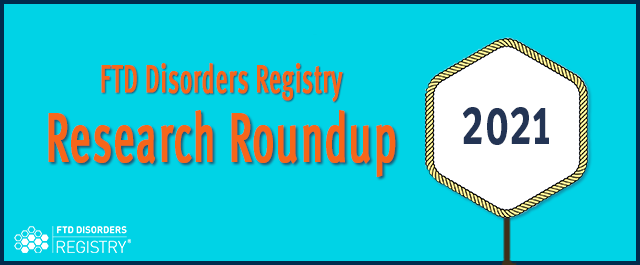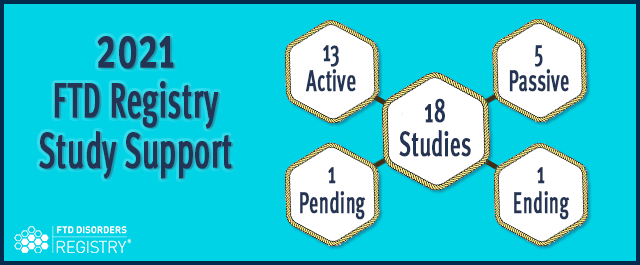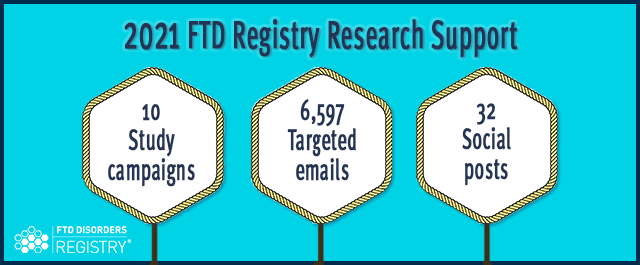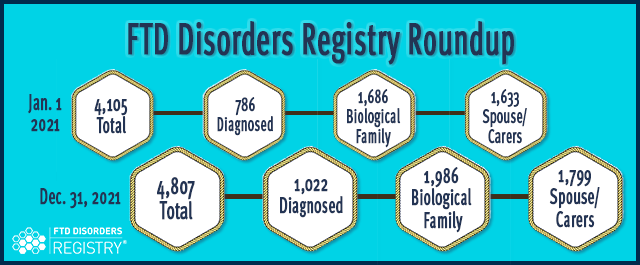PRESS & NEWS
Partnering to Promote Research: A Roundup from 2021

Hey, Partner! Are you ready to saddle up and join the roundup to advance frontotemporal degeneration (FTD) research?
Hey, Partner! Are you ready to saddle up and join the roundup to advance frontotemporal degeneration (FTD) research?
We’ve roped together information on how the FTD Disorders Registry collaborates with studies and then provides a vast array of services to support research recruitment.
As we ride into the New Year, let’s quickly take a look back at how far we traveled last year and the work performed to generate numbers for research.
The year 2021 began timidly for the FTD Disorders Registry and FTD research because of delays and stoppages in 2020 due to the coronavirus pandemic. According to the Western IRB-Copernicus Group (WCG), research programs faced slowdowns to focus on COVID-19 related trials. In December 2020, they noted that the number of studies planned but missing start dates rose by a whopping 265% over the previous month.
In spite of COVID-19 continuing into a second year, the Registry and clinical trials revamped and restarted.
“The FTD Disorders Registry’s overarching goal is to advance the science and assist in moving faster toward finding treatments and cures for the spectrum of FTD disorders,” said Registry Director Dianna Wheaton, MS, PhD, CHES. “To reach this goal, we actively partner with clinicians, scientists, patient advocacy groups, and the pharma/biotech industry.”
One of the ways the Registry partners is through support services that encourage recruitment into research studies and clinical trials.
The FTDDR team collaborates with research staff to understand the individual recruitment needs of that study. Based on what is best for each study, this information is used to create a custom outreach plan and the accompanying materials. Multiple types of content and communication channels are used to reach potentially eligible study participants.


The Registry ended 2021 partnering with 18 clinical research studies representing academic and biotech/pharma researchers. Five of these studies elected passive (non-targeted) methods, and 13 studies chose to use comprehensive referral support using active outreach methods. Additionally, there is one study awaiting approval for support and one study that reached the end of its recruiting period.
Listings for currently supported studies can be found on the Registry’s Find A Study page: https://ftdregistry.org/find-a-study
STUDY SUPPORT SERVICES
All support begins with a basic listing on the Find A Study page. Depending on whether a study chooses passive or active support, services the Registry offers can include:
- Scheduling as a Featured Study in the right column on several Registry webpages
- Creating a blog (text and graphics) for the Registry’s News section
- Writing and posting social media content for the Registry’s Facebook, Twitter, and/or LinkedIn pages.
- Writing an in-depth Featured Study article for newsletter
- Writing an in-depth Featured Research article for newsletter
- Collaborating to produce educational webinars
- Querying the Registry database to target possible participants, generating a list, and sending study-specific recruitment emails
- Designing graphics to accompany articles, posts, and emails.
Last year three studies and their principal researchers were featured in articles published in The Voice of FTD, the Registry’s quarterly email newsletter. Nine studies were highlighted as featured studies on the Registry’s website. The featured study appears in a box in the right-hand column if you are viewing it on a desktop computer, but the box displays toward the bottom of the webpage if you are on a cell phone.

Ten studies chose to have the Registry write content to be used on the Registry’s social platforms. After approval by all parties, including the study staff, their IRB, and the Registry, Registry staff scheduled them to post at intervals. Campaigns in 2021 included an average of three Facebook posts and three Twitter tweets for each study.
Targeted emails are the backbone of active support. The Registry’s database was queried to match potential study candidates based on certain criteria, and a list was created to use for the email. The text was written and graphics designed to draft a study-specific recruitment email. Content was reviewed by all necessary parties, which can include study staff, sponsor, IRB, the Registry, and others. Following approval, the email was scheduled for delivery.
In support of ten research studies, the Registry sent 6,591 of these emails in 2021.
Engagement analytics are tracked for email and social media communications. The Registry compiled detailed reports and reviewed them with the referral partner. This allowed for making changes to messages, methods, and/or avenues.
For mutual benefit, the Registry requires feedback from the study to determine the number of volunteers screened and the number who enrolled that were referred by the Registry.
“Of all of the referral support activities, our most difficult task is tracking the success rate of referrals: such as number of site requests for study information, number of screenings, and number of enrollments,” noted Dr. Wheaton. “The Registry is working with all referral partners to develop better study site tracking and reporting methods.”
PARTICIPANTS DRIVE RESEARCH
The Registry began 2021 with 4,105 participants. By the end of the year, enrollment reached 4,807.

Participants were offered a broad range of engagement and educational opportunities through Registry channels. This included encouraging participation in research and providing both broad and specific information about studies that are recruiting.
It can be challenging to find and navigate information provided about active and enrolling research studies. The Registry’s referral process is aimed at steering eligible participants to opportunities in which they would be interested and might qualify, thus driving research participation.
“While the Registry works closely with academic researchers and biotech/pharma companies to support study recruitment, our goal is to empower and assist the FTD community to proactively participate in the research process,” Dr. Wheaton said. “Together, we can make a difference toward accelerating treatments and cures for FTD.”
Together we can find a cure for ftd
The FTD Disorders Registry is a powerful tool in the movement to create therapies and find a cure. Together we can help change the course of the disease and put an end to FTD.
Your privacy is important! We promise to protect it. We will not share your contact information.



